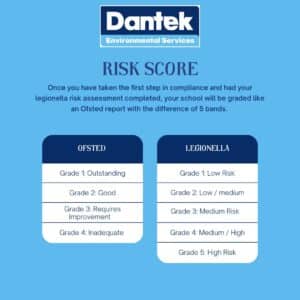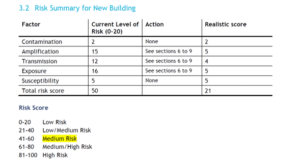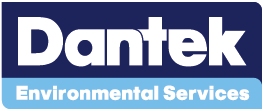Welcome back to the top 5 problems schools face with legionella risk assessments!
This month, I am going to try and help you answer questions 3 and 4. If you have a problem or question that is not covered, please email holly@dantek.co.uk
 Top 5 problems with legionella risk assessments!
Top 5 problems with legionella risk assessments!
- April’s Blog: Is your Legionella risk assessment current and when does it need to be updated? How will you know?
- April’s Blog: Written scheme. What does it mean and how do I write one?
- May’s Blog: How safe can my school ever be?
- May’s Blog: Asset registers. Mind-blowing pages of cold taps, hot taps and mixer valves etc. What’s the point?
- June’s Blog: Remedial actions: Do I have to do all of them and how do I choose the correct contractor?
How safe can my school ever be?
You need to sleep at night knowing that you have done everything that is reasonably practicable to make your school a safe place to learn and grow. Your school can be or already is a safe place and if you follow the advice given by your contractor and local authority it will continue to be.
Legionellosis sounds scary and if not managed life-threatening. Legionellosis is an illness in humans caused by a bacteria called Legionella. We do not have any figures for 2021 or 2022 yet, and figures from 2020 are distorted by Covid. In 2020 the monthly surveillance reports stopped in October with 295 cases reported in the first 10 months of the year. Legionnaires disease is a real threat and requires real action to be taken.
An assessment of the susceptibility of the site population is a critical part of a Legionella risk assessment, which must be reviewed regularly. This takes us back to staff changes and the mental and physical health of your teachers and staff. Risk factors include Males, Age, heavy smokers, alcohol consumption, no exercise, and underlying diseases such as cancer, organ transplant, etc.
Unfortunately, we have little control over stopping Legionella from getting into our water systems. Contamination from small amounts of this bacteria within the mains water and airborne droplets is inevitable. From a risk analysis point of view, we must assume that our systems will encounter Legionella bacteria at some stage in their life cycle.
Risk Factors
- Water temperature between 20–45 °C
- Stored, stagnant and/or re-circulated water
- A source of nutrients for the organism e.g. presence of sludge, scale, organic materials and rust
- Water fittings made of certain materials
- Capacity for aerosol generation
- Numbers & susceptibility of site population
- The ability of management to control risk
Once you have taken the first step in compliance and had your legionella risk assessment completed, your school will be graded like an Ofsted report with the difference of 5 bands.

The reality of the school’s risk from legionella will be the current risk score. Don’t be alarmed, look at the “action to be taken” i.e. risks that can be removed, and then the realistic score for your school following completion of the advised remedial actions.
As you can see from the below example the “New Building” has a current score of 50 which has placed the school into the medium-risk category. By completing the recommended actions, the school or particular academic building will reduce to a low/medium risk with continued monitoring. Be mindful that even the smallest buildings, even if they only have one wash hand basin will be graded with a risk factor.
Risk Summary inc review date

- Must be current.
- High risk = 6 months
- Medium risk = Two years
- Low risk = 5 years
Can your school ever be safe from legionella?
Your school may never be free from legionella, but you can manage and control the risk and prevent staff from catching legionnaires disease. Legionella specialists are available to help you, including Dantek, and by working together as a team we can prevent the harmful effects of water.

- Keep hot water hot
- Keep cold water cold
- Keep the water moving
- Keep it clean
Consider if special steps need to be taken at different times of the academic year. Half term and summer holidays, resulting in a big change to the use of the school. Very few staff and no pupils, resulting in taps and showers that are used regularly during term time have now been left unused for weeks. This can lead to stagnation of the water which can encourage the growth of legionella and other nasty bacteria. Make plans for who is going to flush those normally used outlets at least weekly during the holidays.
Additional information can be found:
Approved code of practice – https://www.hse.gov.uk/pubns/priced/l8.pdf
HSE website – legal updates & outbreaks https://www.hse.gov.uk/index.htm
HSG274 technical guidance https://www.hse.gov.uk/pubns/books/hsg274.htm
Dantek – Advice, services and training https://www.dantekenvironmental.co.uk
Asset Registers: The Key to Efficient Legionella Risk Assessments in Schools
When it comes to ensuring the safety of students and staff in schools, there are many factors that must be considered. One of these is the potential risk of Legionella bacteria in the water system, which can cause Legionnaires’ disease, a potentially fatal form of pneumonia. To prevent this, schools must conduct regular Legionella risk assessments and take appropriate measures to control the risk.
One crucial aspect of Legionella risk assessments is the creation of an asset register. This is a document that lists all the assets in the water system that could potentially harbor Legionella bacteria, such as cold taps, hot taps, and mixer valves. While this may seem like a mind-numbing task, the importance of maintaining a comprehensive asset register cannot be overstated. It is the foundation of effective Legionella risk management and is essential for record-keeping purposes.
When a Legionella risk assessor arrives at a school, it is important that they have access to all the areas they need to inspect. This can be a challenge, as schools have busy schedules and exam timetables that must be taken into account. To ensure that assessors have the access they need, the operational management team must work with the school to determine which areas the assessors will need to inspect. A clear and detailed asset register is essential for this process, as it will provide a complete list of all the assets that require inspection.
Creating an asset register can seem like a daunting task, especially for schools with multiple buildings and thousands of outlets. However, it is an investment in the safety of students and staff, and there are tools available to make the process easier. On completion of the risk assessment, your assessor will be able to provide you with an asset register in Excel, allowing schools to use filters to sort the data by asset type and location. This makes it easy to identify the sentinel points that need to be monitored and recorded every month.
In addition, schools can choose to go paperless with their water hygiene records by using an electronic logbook. This eliminates the need for paper-based logbooks and makes it easier to track compliance. Many reputable providers offer this service, and some, such as Dantek, provide a free electronic logbook to contracted customers. This logbook includes an automatic asset upload and real-time compliance.
Maintaining a comprehensive asset register is a key element of Legionella risk management in schools. By investing in this process and using tools such as electronic logbooks, schools can ensure the safety of their students and staff while reducing the administrative burden of compliance. To learn more about Legionella risk assessments in schools or to schedule a free demonstration of Dantek’s electronic logbook, visit our website or call our friendly team.
#legionellacontrolinyourschool #legionellacontrol #riskassessment #legionellariskassessment #teamdantek #legionellaadvice #riskassessmentproblems #safeschools #remedialactions #assetregister #riskassessmentupdate #writtenscheme #legionellacontractorsouthwest #legionellacontratorsouthwales #legionellacontractorwestmidlands #electroniclogbook

Contact us for more information or to book a free demonstration.



 Top 5 problems with legionella risk assessments!
Top 5 problems with legionella risk assessments!



 Contact us for more information or to book a free demonstration.
Contact us for more information or to book a free demonstration. Our website is a great tool for local services, FAQs, sectors, and price guides. please visit
Our website is a great tool for local services, FAQs, sectors, and price guides. please visit